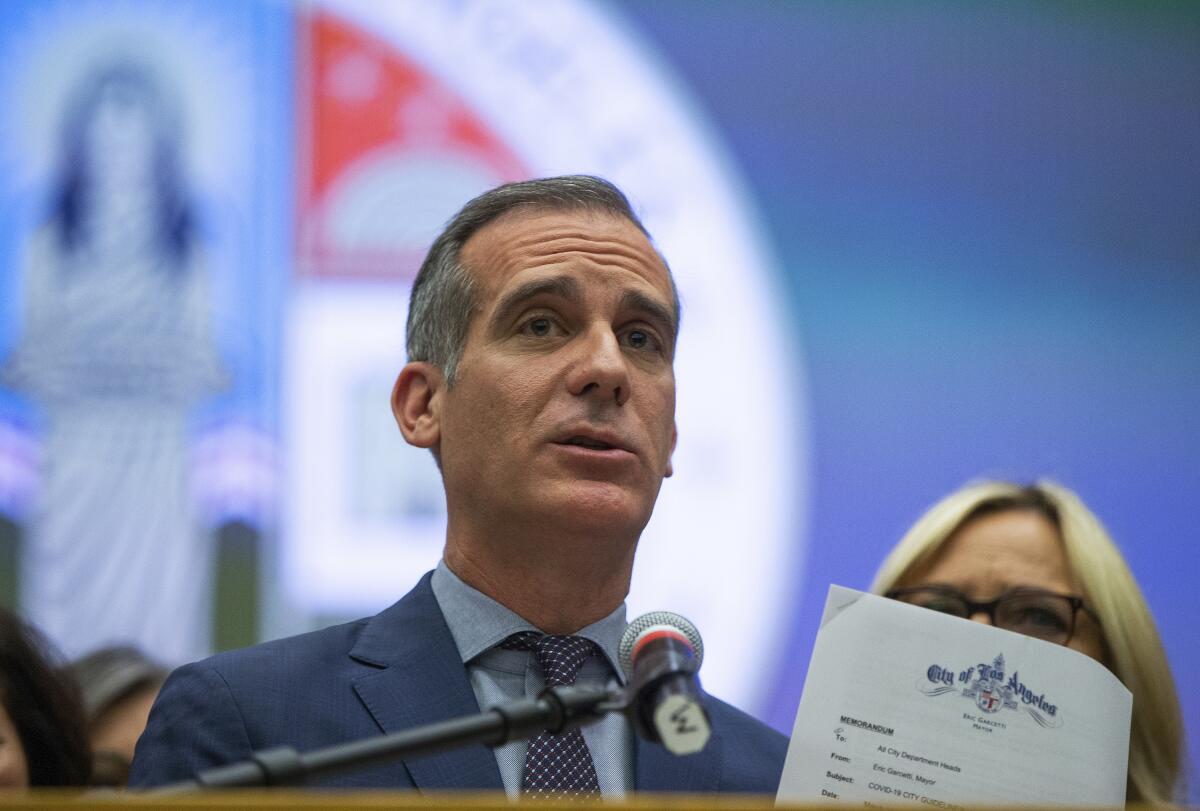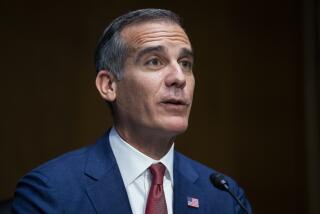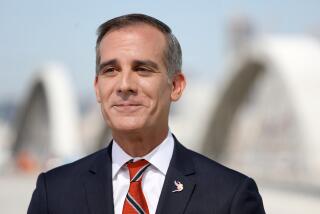Garcetti joins other mayors to call for more federal funding to fight violence during pandemic

- Share via
Los Angeles Mayor Eric Garcetti and more than a dozen other mayors from across the country have called on Congress to provide more federal funding to fight gun violence, which has continued during the COVID-19 pandemic.
The mayors, along with the gun policy reform organization Giffords, specifically called for assistance in maintaining violence interruption programs as economic turmoil related to the coronavirus continues to create budget shortfalls.
“Our emergency resources are dedicated to protecting public health and safety, but we do not have enough healthcare resources to fight both these battles,” Garcetti and the other mayors wrote. “We need our healthcare resources to combat COVID-19, and we need specific resources to tackle gun violence and support the frontline workers and organizations who are already working to do so.”
Violence intervention workers have been deemed “essential workers” in Los Angeles and continued working to smother street beefs and keep the peace amid state and local shutdowns. They are viewed as trusted arbiters in neighborhood disputes, particularly in areas where law enforcement enjoy little trust.
However, strain on the city’s budget has left them vulnerable. Gang intervention programs were identified for reduced city funding under Garcetti’s latest proposed budget, along with things like street repairs, tree trimming and graffiti removal.
Last month, Garcetti said without an influx of federal funding to bolster the city’s budget during this downturn, “there may be further cuts and there may be even deeper things that we have to do with our city services and our workforce.”
The letter to Congress was dated Friday and addressed to leaders including Sen. Mitch McConnell, (R-Ky.) the Senate majority leader, and U.S. Rep. Nancy Pelosi, (D-San Francisco), the House speaker.
“While combating the virus is a top priority, gun violence and gun deaths continue to claim lives and devastate communities,” the mayors wrote. “Despite social distancing and stay-at-home orders, gun violence rates remain persistently high in cities, disproportionately impacting black and brown communities who are also among the most vulnerable to COVID-19.”
On Monday, Garcetti said the federal funding he is seeking would not be used to simply backfill cuts in his budget, but to expand the number of gang intervention workers in the city overall, including in neighborhoods that are “right on the cusp” of a brighter future.
“We’ve always been looking toward expanding,” he said of the city’s gang intervention work. “We know we can stop gun violence. We can save lives.”
He said he did not have a specific funding level in mind, but believes the city could benefit from having the program be much larger.
“The best way to stop a bullet is with jobs and programs, not with more policing,” he said.
In California, Garcetti was joined in signing the letter by Oakland Mayor Libby Schaaf and Stockton Mayor Michael Tubbs. Other mayors signed from all across the country, including in some of the nation’s most violent cities, such as Baltimore.
Los Angeles saw a decline in crime in the first weeks of social distancing measures and shutdowns related to the coronavirus spread, but that lull has ebbed. Overall shootings through April 25 remained down nearly 14%, though they had picked back up from larger initial declines compared to the same period the year prior. Homicides had returned to near even, with 81 people killed in Los Angeles this year compared to 80 during the same period the year prior.
Other cities have seen much larger increases in gun violence and killings, the coalition of mayors noted.
“As the COVID-19 pandemic depletes our budgetary resources, many cities may be unable to sustain these lifesaving community-based interventions,” the mayors wrote. “To help keep violence interrupters on the job, keep the peace, and protect lives in our communities, we write to request that federal emergency funding measures include funding dedicated specifically toward sustaining community-based violence intervention initiatives in communities most impacted by shootings and community violence, as well as direct emergency aid to cities battling these twin challenges.”
More to Read
Sign up for Essential California
The most important California stories and recommendations in your inbox every morning.
You may occasionally receive promotional content from the Los Angeles Times.










